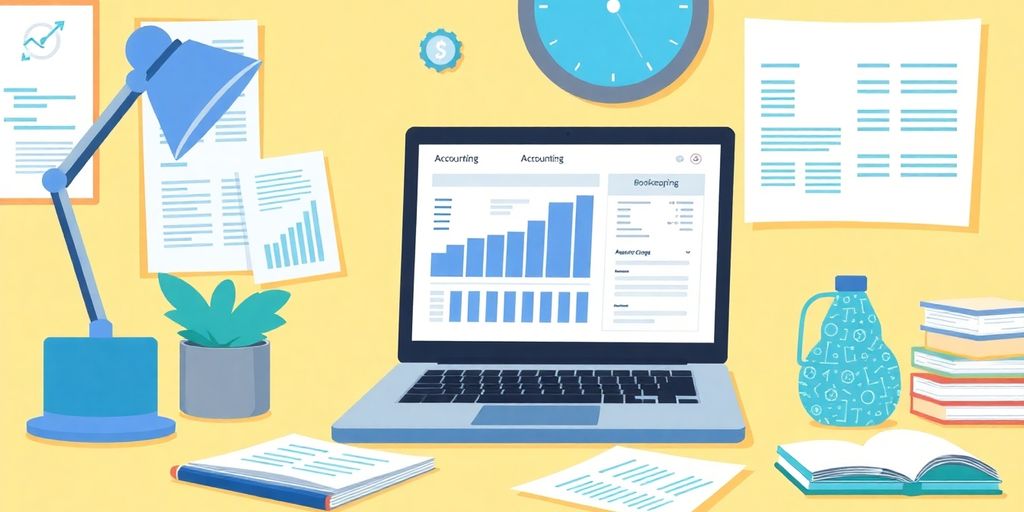Accounting Automation: How AI Tools Are Transforming Small Business Bookkeeping
Explore how artificial intelligence is revolutionizing bookkeeping for small businesses through automation.
Artificial intelligence (AI) is changing the way small businesses handle their finances. With the ability to automate repetitive tasks, analyze data more quickly, and provide insights that were once hard to obtain, AI tools are becoming essential in bookkeeping. This article will explore how these technologies are making bookkeeping easier, faster, and more efficient for small business owners.
Key Takeaways
- AI is revolutionizing bookkeeping by automating routine tasks.
- Small businesses can benefit from faster data analysis and reporting.
- Implementing AI tools can streamline invoice and expense management.
- Training staff on AI tools is crucial for successful integration.
- Ethical considerations like data privacy must be addressed when using AI.
Understanding Artificial Intelligence In Bookkeeping

Defining Artificial Intelligence
Okay, so what is AI, really? It's more than just robots taking over the world, I promise. In the context of bookkeeping, AI refers to the ability of computer systems to perform tasks that usually require human intelligence. This includes things like learning, problem-solving, and decision-making. Think of it as software that can analyze financial data, identify patterns, and automate processes without needing constant human intervention. It's about making bookkeeping smarter, faster, and more accurate. It's not perfect, but it's getting there.
Key Benefits of AI in Accounting
AI in accounting? It's a game-changer, honestly. Here's why:
- Accuracy: AI can reduce errors in data entry and calculations, leading to more reliable financial records.
- Efficiency: Automating tasks frees up time for accountants to focus on more strategic activities.
- Cost Savings: By automating routine tasks, businesses can reduce labor costs.
- Improved Insights: AI can analyze large datasets to identify trends and patterns that humans might miss.
AI isn't about replacing accountants; it's about augmenting their abilities. It handles the tedious stuff, so they can focus on analysis and strategy.
Challenges of Implementing AI Tools
Alright, so AI sounds amazing, but it's not all sunshine and rainbows. Getting AI tools up and running in your bookkeeping can be tricky. Here's the lowdown:
- Cost: Some AI solutions can be expensive, especially for small businesses.
- Integration: Getting AI tools to play nice with your existing systems can be a headache.
- Data Quality: AI is only as good as the data you feed it. If your data is messy, the results will be too.
- Lack of Expertise: You might need to hire someone who knows their way around AI to get the most out of these tools.
- Security Risks: AI systems can be vulnerable to cyberattacks, which could compromise sensitive financial data.
Streamlining Financial Processes With Automation
Automating Data Entry
Data entry, the bane of many bookkeepers' existence, is ripe for automation. Think about it: manually inputting invoices, receipts, and bank statements? It's not only tedious but also prone to errors. AI-powered tools can extract data from these documents automatically, significantly reducing the time spent on this repetitive task. This frees up your time to focus on more strategic financial activities. For example, tools can now extract structured data from unstructured text, like pulling names, dates, and amounts from invoices.
Enhancing Invoice Management
Invoice management can be a real headache, especially for growing small businesses. Keeping track of who owes what, when payments are due, and chasing down late invoices can consume a lot of time. AI can help automate the entire invoice lifecycle, from creation and sending to tracking and reconciliation.
- Automated invoice generation.
- Smart reminders for overdue payments.
- Automated matching of payments to invoices.
Simplifying Expense Tracking
Expense tracking is another area where automation can make a huge difference. Manually recording and categorizing expenses is time-consuming and often inaccurate. AI-powered expense tracking tools can automatically capture expenses from various sources, such as bank feeds, credit card transactions, and scanned receipts. These tools can also automatically categorize expenses based on predefined rules, making it easier to generate accurate financial reports. This is a game changer for small business owners who struggle to keep up with their expenses.
By automating these core financial processes, small businesses can significantly reduce their administrative burden, improve accuracy, and gain better visibility into their financial performance. This allows them to make more informed decisions and focus on growing their business.
The Role of AI in Financial Analysis
Predictive Analytics for Small Businesses
AI is changing how small businesses look at their finances. Instead of just seeing what happened, AI can help predict what will happen. This is a big deal because it lets you plan better. Imagine knowing when you might have cash flow problems or when sales are likely to spike. That's the power of predictive analytics. It's not perfect, but it's way better than guessing. AI algorithms analyze past data to forecast future financial trends.
- Sales Forecasting
- Cash Flow Prediction
- Risk Assessment
Real-Time Financial Reporting
Remember waiting weeks for financial reports? Those days are fading. AI makes it possible to get financial reports in real-time. This means you can see how your business is doing right now, not last month. This is super useful for making quick decisions and spotting problems early. No more surprises at the end of the quarter!
Real-time reporting allows for immediate insights into key performance indicators (KPIs), enabling businesses to adjust strategies promptly and maintain financial health.
Improving Decision-Making Processes
With better data and predictions, you can make smarter choices. AI can help you see patterns and connections that you might miss. Should you invest in new equipment? Is it a good time to hire more staff? AI can give you the information you need to answer these questions with confidence. It's like having a financial advisor that never sleeps. AI-driven insights can significantly enhance financial efficiency by providing a clearer picture of a company's financial standing.
Here's a simple example:
Integrating AI Tools Into Existing Systems
Okay, so you're sold on AI for your bookkeeping. Great! But how do you actually get it to work with what you already have? It's not always plug-and-play, but with a little planning, it can be done. Let's break it down.
Choosing the Right AI Solutions
First things first: not all AI tools are created equal. You need to find one that fits your specific needs and integrates well with your current accounting software. Think about what you want to automate. Is it primarily data entry? Invoice management? Expense tracking? Look for AI solutions that specialize in those areas. Read reviews, watch demos, and don't be afraid to ask for a trial period. It's better to test-drive a few options than to commit to something that doesn't quite fit. Consider how well the AI solution integrates with your existing CRM system to ensure smooth data flow and avoid data silos.
Overcoming Integration Challenges
Alright, so you've picked your AI tool. Now comes the fun part: getting it to play nice with your existing systems. This can be tricky, especially if you're using older software. One of the biggest hurdles is data compatibility. Make sure the AI tool can read and interpret your data correctly. You might need to do some data cleaning or reformatting to get everything in sync. API integrations are your friend here. See if the AI tool offers an API that you can use to connect it to your other systems. If not, you might need to look into third-party integration tools or even hire a developer to build a custom integration. Don't underestimate the time and effort this can take.
Training Staff on New Technologies
So, the AI is integrated, the data is flowing, and everything should be working smoothly. But there's one more crucial piece of the puzzle: your staff. They need to know how to use the new AI tools effectively. This means providing adequate training and support. Show them how to input data, interpret the results, and troubleshoot any issues that might arise. Emphasize that AI is there to help them, not replace them. It's a tool to make their jobs easier and more efficient. Encourage them to embrace the new technology and provide feedback on how it can be improved. A well-trained staff is key to successful AI adoption.
Change is hard, and people are often resistant to new technologies. Make sure to communicate the benefits of AI clearly and address any concerns your staff might have. Highlight how AI can free them up from tedious tasks and allow them to focus on more strategic and rewarding work. A little empathy can go a long way in ensuring a smooth transition.
Case Studies of Successful AI Implementation
Small Business Success Stories
Okay, so let's talk about some real wins. You know, the kind where a small business owner is pulling their hair out one minute, and then, BAM, AI swoops in and saves the day. I've heard a few stories that are pretty cool. For example, there's this bakery down the street that was always struggling with inventory. They'd either run out of stuff way too early or have tons of waste at the end of the day. They implemented an AI-powered system that predicts demand based on weather, local events, and past sales. Now, they're reducing waste by like 30% and actually making more money. It's not just about saving cash; it's about making smarter choices. Another example is a local landscaping company that uses AI to optimize their routes and scheduling. They're saving on fuel and getting more jobs done each day. It's pretty neat to see these tools making a difference.
Lessons Learned from AI Adoption
So, what have we learned from watching these businesses jump on the AI bandwagon? Well, it's not always smooth sailing. One thing that keeps popping up is the importance of data quality. If you feed the AI garbage, it's gonna spit out garbage. Makes sense, right? Also, don't expect AI to solve all your problems overnight. It's a tool, not a magic wand. You need to understand your business processes and figure out where AI can actually help. And, maybe most importantly, don't forget about your employees. They need to be trained on how to use these new tools, or they're just gonna end up frustrated and confused.
It's also important to start small. Don't try to automate everything at once. Pick one or two key areas where AI can make a real difference, and then expand from there. This way, you can learn as you go and avoid making costly mistakes.
Future Trends in AI for Accounting
What's next for AI in accounting? I think we're gonna see even more automation of routine tasks, like data entry and reconciliation. But, more excitingly, I think we'll see AI playing a bigger role in financial analysis and decision-making. Imagine having an AI assistant that can analyze your financial data in real-time and give you insights into where you can cut costs, increase revenue, and improve your bottom line. That's the kind of stuff that could really change the game for small businesses. Plus, with the rise of things like machine learning, these systems are only going to get smarter and more effective over time. Here are some trends to keep an eye on:
- Hyperautomation: Automating almost every repeatable task.
- AI-driven Audits: AI helping to detect fraud and errors more efficiently.
- Personalized Financial Advice: AI providing tailored advice to business owners.
The Future of Bookkeeping With Artificial Intelligence
Emerging AI Technologies
So, what's next for AI in bookkeeping? Well, a few things are on the horizon. We're talking about more advanced machine learning that can adapt to changing business needs without constant human tweaking. Think AI that can learn from its mistakes and get better over time, almost like it's gaining experience. Also, expect to see more natural language processing (NLP) that makes interacting with accounting software feel like chatting with a colleague. No more deciphering complicated menus or codes!
Potential Impact on Employment
Okay, let's address the elephant in the room: jobs. Will AI replace bookkeepers? It's a valid question. The reality is more nuanced than a simple yes or no. While AI will automate many routine tasks, it's also likely to create new roles focused on managing and maintaining these AI systems. Bookkeepers might spend less time on data entry and more time on financial analysis and strategic planning. It's about adapting and learning new skills.
Preparing for an AI-Driven Future
So, how do you get ready for this AI-powered future? Here are a few ideas:
- Embrace lifelong learning: Keep your skills sharp by taking courses or workshops on AI and related technologies.
- Focus on soft skills: Things like communication, problem-solving, and critical thinking will become even more important as AI handles the more repetitive tasks.
- Experiment with AI tools: Get familiar with the AI-powered accounting software that's already out there. The more you play around with it, the better you'll understand its capabilities and limitations.
The shift towards AI in bookkeeping isn't about robots taking over. It's about humans and machines working together to create more efficient and insightful financial management. It's a chance to move beyond the mundane and focus on what really matters: growing your business.
Ethical Considerations in AI Accounting

AI in accounting? It's pretty cool, right? But like any powerful tool, it comes with a bunch of ethical questions we need to think about. It's not just about making things faster; it's about making sure we're doing things right.
Data Privacy Concerns
Okay, so AI thrives on data. Lots and lots of it. But what happens when that data is, you know, our data? We're talking about sensitive financial information here, and keeping it safe is a big deal. Think about it: customer details, transaction histories, all that stuff. We need to be super careful about how we collect, store, and use it. Data breaches are bad enough, but when it's financial data, the stakes are even higher. We need solid security and clear rules about who gets to see what.
Bias in AI Algorithms
AI algorithms are only as good as the data they're trained on. If that data reflects existing biases, guess what? The AI will, too. Imagine an AI that's used to assess loan applications. If the training data mostly includes successful loans given to men, the AI might unfairly favor male applicants. That's not okay. We need to actively work to identify and correct these biases to make sure AI is fair and equitable.
Regulatory Compliance Issues
Regulations are already complex, and AI adds another layer of complexity. Are we following all the rules when we use AI in accounting? Are we being transparent about how these systems work? It's easy to get lost in the technical details, but we can't forget about the legal and regulatory side of things. We need to stay up-to-date on the latest requirements and make sure our AI systems are compliant. It's a moving target, but it's essential.
It's important to remember that AI is a tool, and like any tool, it can be used for good or for ill. It's up to us to make sure we're using it responsibly and ethically. This means being mindful of data privacy, addressing biases in algorithms, and staying compliant with regulations. The future of accounting depends on it.
Wrapping It Up
In conclusion, AI tools are really shaking things up for small business bookkeeping. They’re making it easier to handle the numbers, cut down on mistakes, and save time. Sure, there’s still a bit of a learning curve, but the benefits are hard to ignore. As these tools get better, we can expect even more changes in how we manage finances. For small business owners, embracing these technologies might just be the key to staying competitive and efficient in a fast-paced world. So, if you haven’t looked into accounting automation yet, now might be the perfect time to start.
Frequently Asked Questions
What is accounting automation?
Accounting automation uses technology, like AI, to help manage financial tasks without needing a lot of manual work.
How can AI help small businesses with bookkeeping?
AI can make bookkeeping easier by automating tasks like data entry, tracking expenses, and managing invoices.
What are the benefits of using AI in accounting?
Using AI can save time, reduce mistakes, and help businesses make better financial decisions.
Are there any challenges when using AI for bookkeeping?
Yes, some challenges include costs, needing to train staff, and making sure the AI works well with existing systems.
Can AI improve financial reporting?
Absolutely! AI can provide real-time reports and help predict future financial trends.
What should businesses consider before using AI tools?
Businesses should think about their specific needs, the costs involved, and how they will train their employees to use the new tools.








